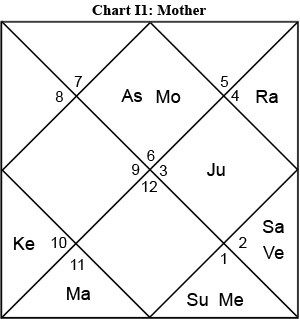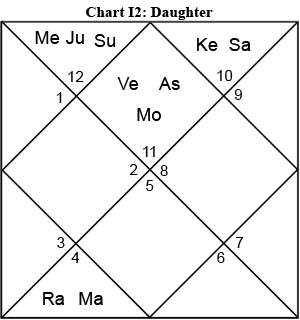| Free Jyotish Newsletter |
 Jyotish.ws
Jyotish.wsHappiness from the Vedic (Astrology) Perspective
| By Michael Laughrin, Michael@jyotish.ws |  |
When I first started to do research on happiness, I thought that this old formula would be enough to indicate happiness in a birth chart:
1. The 4th house itself, and
2. Lord (ruler) of the 4th house, and
3. Karakas (significators) of the 4th house (in this
case, the Moon and Venus).
While the above indicators certainly play a substantial role in determining happiness, certain other factors are even more important. In a word, they are the natural benefics—Jupiter, Venus, Mercury and the Moon (and also Mars, only if well placed). The single most important indicator of happiness is Jupiter, who is seen by Jyotishis as the Teacher of the Devas. In Western astrology, he is called the Greater Benefic—in other words, the best good guy. Among his significations are tradition, children, the guru, religion, philosophy, higher education, elder brother, the Law, all professions, and financial success. Each of these words suggests one type of socially acceptable happiness or another. Another very important indicator of happiness is the 1st house. As a matter of fact, the 1st house is so extremely important that, in my opinion, there can be no real success in life—in ANY arena—without the blessings of the house of the Self (the 1st house).
It is quite true that the lord of the 4th house in the 1st house, or the lord of the 1st house in the 4th house, does tend to show us a happy person, but the natural benefics are mentioned in the classical texts relating to happiness far more often than the 1st and 4th houses.
Mr. K. N. Rao, founder of the world's largest astrology school in Delhi, has said that Mercury in the 1st house relieves 1,000 evils; Venus in the 1st house relieves 10,000 evils and Jupiter in the 1st house relieves 100,000 evils. Also he has said that benefics in angles and malefics (the Sun, Mars, Saturn, Rahu and Ketu) in houses 3, 6 and 11 tend to make for a successful and happy individual.
Why should the planet Mars be equated with happiness? Perhaps because Mars stands for will power. In this world we must often will ourselves to be happy. We create our own destinies, to a large degree, and Mars gives us the necessary drive to do so.
Let us look at some combinations found in the classical texts, just to get a rough idea of the patterns that create happiness or fulfillment or contentment.
- Bhrigu Sutras
- Mercury in the 1st house in its own sign
- Venus in the 4th house
- Brihat Jataka
- Jupiter aspects the Moon—will enjoy happiness and long life
- If the Moon is in Cancer at the start of any dasha or bhukti—honor, wealth and happiness will come
- If at the start of any planet's dasha or bhukti the Moon is in Sagittarius or Pisces—honor, wealth and happiness will ensue
- When Jupiter reigns, happiness, wealth and honor will be found
- Sankata Nidhi
- If the Lagna Lord is strong and in the 4th house, the native gets land, vehicles, inherits his mother's property and enjoys happiness and comforts
- If the 4th Lord is in the 1st house, the native will be learned and happy throughout his life
- If the 4th Lord is in the 2nd house while the 2nd Lord is exalted, in its own sign, or in a friendly sign (in rashi or Navamsha), then various kinds of happiness and a wonderful family life will be found
- If the 4th Lord is in an angle or a trine, with strength, then happiness is sure to exist for that native. However, one must look at that planet (the 4th Lord) also in the Navamsha and the Trimsamsha.
- Brihat Jataka
- Moon in Poorvashadha = happiness and an agreeable wife
- Jupiter in Aquarius = happiness
- Sanketa Nidhi
- Mars = happiness
- Saravali
- A planet that is conjunct the Moon bestows complete happiness
- Moon in Gemini = happiness
- Mars aspects the Moon in Gemini = happiness, wealth, beauty, valor and is learned
- Moon in Pisces = music, arts, learned in Shastras, happiness and wins over others
- Venus in Taurus or Libra and is aspected by the Moon = happiness, wealth, respect and sons. The native has excellence and is splendorous
- If in the Ashtakvarga, the Moon has 8 bindus, the native will have affluence and pleasures
- The Moon in the 9th house = happiness, money, brains, sons, and attracts women. He will be devoted to divine and paternal assignments
- The Moon in the 2nd house = happiness, money and friends
- Moon conjunct Venus in the 1st house = great happiness
- In the dasha of the Moon in the 11th house, the native will enjoy money, good food, nice clothes, recreation, wife, son and happiness
- If Mercury aspects the Moon in Leo, the native will be like a female; and he will enjoy money, happiness and pleasures
These are a few of the combinations for happiness I found in the classical texts (using Vedic Astrology Bookshelf by GeoVision Software). Now we will look at the charts of two women, a mother and a daughter, who have rather good combinations for happiness, contentment and fulfillment in their charts.
 Chart I1 is of a 64-year-old
female who is
running
Mercury dasha, Venus bhukti.
Chart I1 is of a 64-year-old
female who is
running
Mercury dasha, Venus bhukti.
What do we see concerning possible indicators in the chart?
1. The Lord of the 4th house (of happiness) is the
highest planet in the sky in the 10th house, from which
it aspects its own sign, Sagittarius, in the 4th house.
2. The Moon, the natural indicator of the emotions, is
in the 1st house and is bright.
3. Venus, the other significator of the emotions, is in
its own sign of Taurus in the 9th house. It forms a
MahaLakshmi Yoga which gives prosperity to the
native.
4. Mars, representing will power, aspects the 1st
house and the Moon, giving the native the strength to
achieve what she wants.
5. We have a wonderful Gaja-Kesari Yoga formed by
the Moon and Jupiter being in angles from each
other. This indicates wisdom, honor, truthfulness,
and goodness. These qualities are generally
associated with happiness.
 Now look at Chart I2. This is for a 44-year-old
female
who is the daughter of the owner of Chart I1.
Now look at Chart I2. This is for a 44-year-old
female
who is the daughter of the owner of Chart I1.
1. The Moon and Venus are conjunct in the 1st house.
This means that the two planets most indicating
fulfillment of emotions are helping each other
greatly.
2. The Lord of the 4th house (Venus) is placed in the
1st house.
3. Jupiter, that most important indicator of happiness,
is in his own sign of Pisces in the 2nd house.
4. Mercury, while being debilitated, has
NeechaBhanga by being with Jupiter in its own sign.
5. Four out of five of the natural malefics (Mars, Saturn,
Rahu and Ketu) are out of the way in the 6th and 12th
houses. From those positions, they cannot much
disrupt the native's cheerfulness, happiness, and zeal
for living.
So, in conclusion, what shows happiness in a kundali (birthchart)?
1. Strongly placed natural benefics
2. Some connection between the 1st house and the
4th house
3. Natural malefics being in upachaya houses (3, 6,
10 or 11) or in dusthanas (6, 8, 12 and maybe 3); in
other words, being out of the way
4. If several natural benefics are conjunct or aspect
each other, it further strengthens the capacity for
happiness and fulfillment
5. The Moon being in its own sign or a sign of Jupiter
May you find the Happiness you are looking for and deserve.
(c) copyright 2007 Michael Laughrin.
From the August/September, 2007 issue of Michael Laughrin's North American Jyotish
Newsletter. Click to subscribe to this free Jyotish newsletter.
Read more articles by Michael Laughrin.
Yagyas offered by Michael Laughrin.
Learn about Michael Laughrin's credentials.